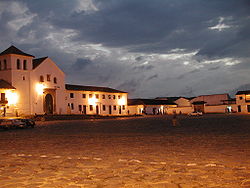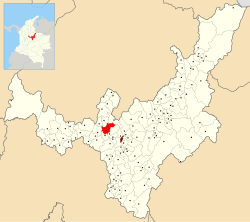Villa de Leiva
| Villa de Leyva | |||
|---|---|---|---|

Church of Villa de Leyva on the central square
|
|||
|
|||
| Nickname(s): Villa de Nuestra Señora de Santa Maria de Leyva |
|||
 Location of the town of Villa de Leyva and the Leyva municipality in Boyacá Department |
|||
| Coordinates: 5°38′N 73°32′W / 5.633°N 73.533°WCoordinates: 5°38′N 73°32′W / 5.633°N 73.533°W | |||
| Department | Boyacá Department | ||
| Province | Ricaurte Province | ||
| Founded | June 12, 1572 | ||
| Founded by | André Diaz Venero de Leyva | ||
| Government | |||
| • Mayor | Víctor Hugo Forero (2016-2019) |
||
| Area | |||
| • City | 128 km2 (49 sq mi) | ||
| Elevation | 2,149 m (7,051 ft) | ||
| Population (2015) | |||
| • City | 16,984 | ||
| • Density | 130/km2 (340/sq mi) | ||
| • Urban | 9,926 | ||
| Time zone | Colombia Standard Time (UTC-5) | ||
| Website | Official website | ||
Villa de Leyva, also called Villa de Leiva, is a touristic colonial town and municipality, in the Ricaurte Province, part of the Boyacá department of Colombia. The town is located 37 kilometres (23 mi) west of the departmental capital Tunja. It is "three and a half hours by car or bus from Bogotá."
Located away from major trade routes in a high altitude valley of semi-desert terrain, and with no mineral deposits nearby to exploit, the town has undergone little development in the last 400 years. As a consequence, it is one of the few towns in Colombia to have preserved much of its original colonial style and architecture: the streets and large central plaza are still paved with cobblestones, and many buildings date from the sixteenth century. This has resulted in Villa de Leyva becoming one of Colombia's principal tourist attractions, and it was declared a National Monument on December 17, 1954 to preserve its architecture. The town and the surrounding countryside, which contains several sites of interest, are popular weekend destinations for citizens of Bogota, and attract an increasing number of foreign tourists.
The urban centre of Villa de Leyva is located in an intermontane valley on the Altiplano Cundiboyacense at 2,149 metres (7,051 ft).
The area of Villa de Leyva was . The earliest archaeological evidence has been surfaced around El Infiernito, an archeoastronomical site dating back to pre-Herrera times. The Muisca were the inhabitants of the area at the time of the Spanish conquest and the zaque of Hunza ruled over the area of Villa de Leyva.
The town was founded on June 12, 1572 by and named after the first president of the New Kingdom of Granada, Andrés Díaz Venero de Leiva.
...
Wikipedia


